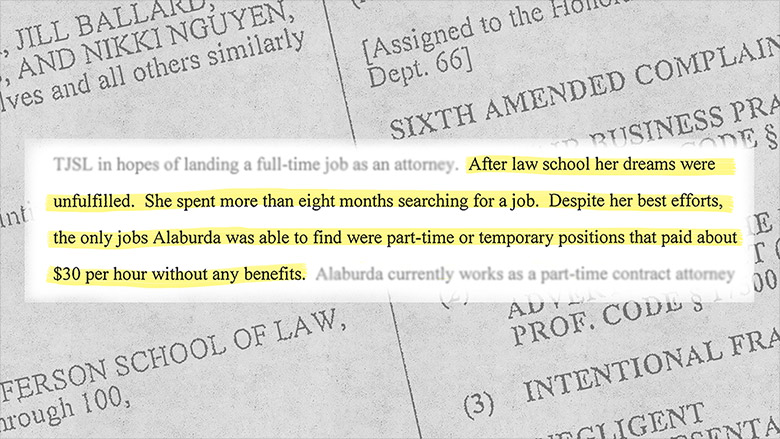
Anna Alaburda still couldn't find a job as an attorney three years after graduating from Thomas Jefferson School of Law. So she sued the school.
This isn't the first time a law school's been sued by former students, but it's rare for one to make it to trial. This one started Monday.
Alaburda claims the school misrepresented the number of its students who found jobs after graduating, and that she wouldn't have enrolled if she knew it was inflated.
Instead, she borrowed $100,000 to get her law degree at Thomas Jefferson School of Law in San Diego. She passed the California bar exam on her first attempt, but was unable to find employment, according to court documents.
The job placement stat in question was published in U.S. News and World Report, which ranks graduate schools each year and is a go-to reference for those comparing programs. When Alaburda was applying to Thomas Jefferson in 2004, the school reported that 80% of its recent graduates found jobs within nine months.
She assumed that referred to law-related jobs. Turns out, it didn't.
Judge Joel Pressman allowed the case to go to trial, which began Monday in California Superior Court in San Diego. He wrote that it was reasonable for someone to assume the employment figures didn't include "any and all" jobs, and a figure that does is "meaningless in the context of a legal education."

In court documents, Thomas Jefferson said it reported post-graduate employment correctly -- by the method required by U.S. News and the American Bar Association.
Law school rankings are dependent on this nine-month employment statistic, among other things including LSAT scores and completion rates.
Related: DeVry University sued for 'deception'
"When the market was tanking for law school grads, you'd get hammered in the rankings if you didn't count all kinds of employment. Circa 2011, every school had about a 97% employment rate," said William Henderson, a law professor at Indiana University.
At the same time, the National Association for Law Placement was reporting employment rates closer to 65% for law school grads who were finding jobs in the legal field.
The method of reporting has changed since Alaburda first filed her lawsuit in 2011, around the same time a handful of other students filed similar ones. Most have since seen their cases dismissed.
Law schools must now report details about the jobs grads are getting, indicating whether you need to pass the bar for the position, if having a J.D. is an advantage, and if it's full- or part-time. The school must report these numbers to the American Bar Association
Last year, Thomas Jefferson said 92 of its 293 (31%) grads found a job that required bar passage. Another 78 (about 27%) were unemployed but looking for a job, and the status of 28 grads was unknown.
But transparency alone doesn't make the job market easier for law grads. While it's improving, just 66% of those in the class of 2014 have found a job that required passing the bar, according to NALP. It was the first year the employment rate for law school grads rose since 2007.
More than 10% are unemployed. And the median starting salary of $63,000 is well below what it was before the recession: $72,000.
Related: Brooklyn Law School to give unemployed grads money back
It's unclear whether Alaburda ever got a job as an attorney since she first filed the suit five years ago. Her attorneys were not made available for comment for this story.
In one court document that references her deposition, she admits to turning down an offer by a Southern California law firm paying $60,000 because it would not pay for her bar dues and required her to travel for one month of training.
While the law school would not comment on specifics of the case during litigation, it issued a statement from Dean Thomas Guernsey late Monday that said the school "is whole-heartedly committed to providing our students with the knowledge, skills and tools necessary to excel as law students, pass the bar exam and succeed in their professional careers."
